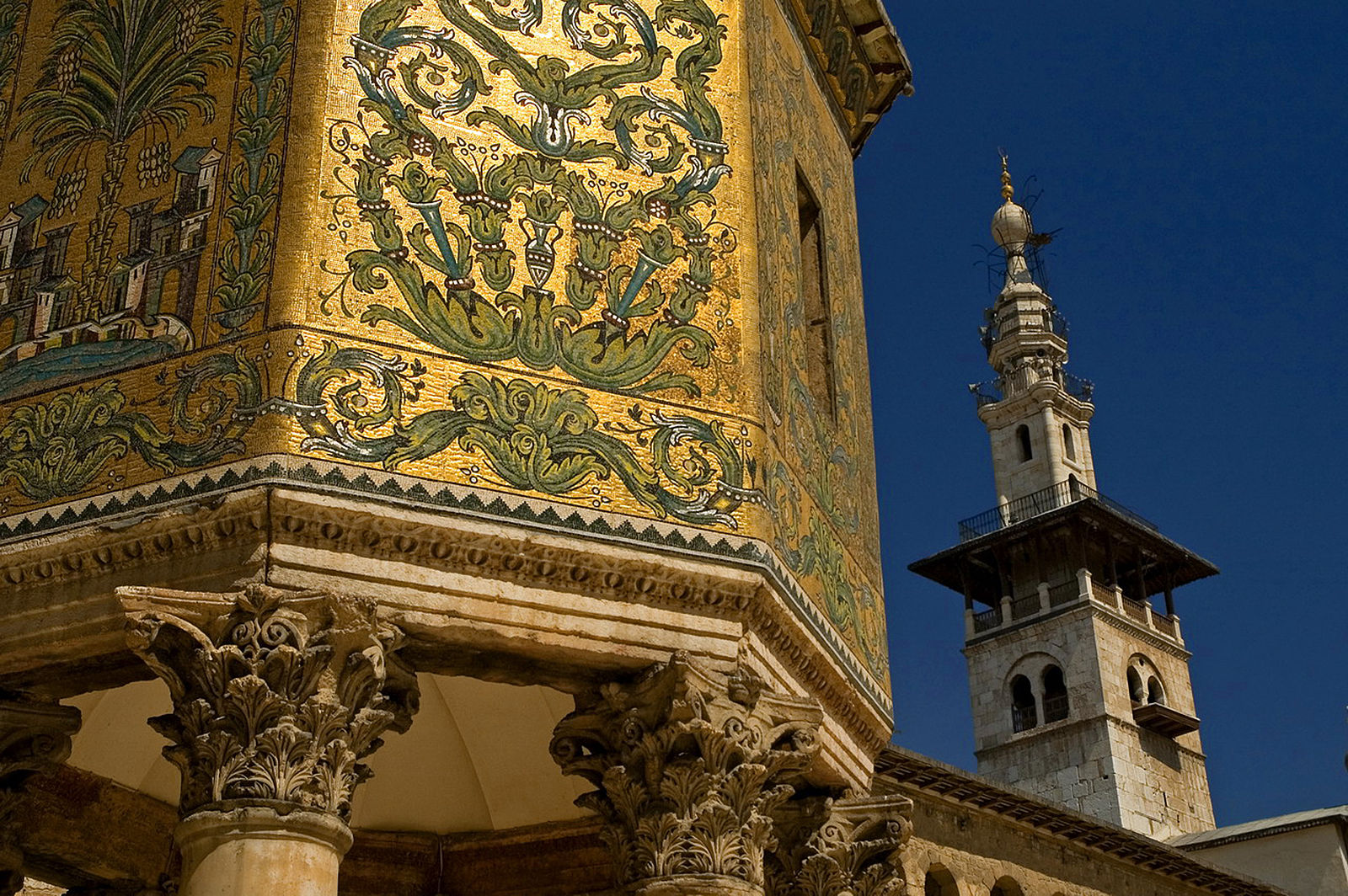
POWR Talk: What does Islam say about democracy?
Courtney Freer
Picture of The Umayyad Mosque in Damascus, Syria by James Gordon (CC BY 2.0)
This article is part of our “Reassessing Democracy: Contemporary Perspectives” series. If you’d like to check out other articles in this series, click here.
Since the 9.11 attacks and subsequent Global War on Terror, one of the major fields of study related to Islam in the United States and Western world more broadly has been the religion’s relationship with democracy. Complicating this question, of course, is the fact that Islam, aside from containing two main sects and several other sub-sects, can and has been interpreted in a variety of ways. There is no pope in the Islamic tradition, which allows for Muslim and non-Muslim commentators alike to give unnuanced and often unpopular views about the relationship between Islam and democracy. For instance, Jacques Derrida claimed that Islam is “the other of democracy.”
Further, given that the vast majority of specifically Middle Eastern, Muslim-majority states are non-democratic, many commentators over the course of this debate have questioned whether there is something unique about the religion that impedes a relationship with pluralistic politics (defined as a diverse and heterogeneous political environment), regardless of the context in which it operates. Some attempted to use Islamic history to explain Islam’s relationship with democracy, notwithstanding that European states have not been universally democratic. In the words of Bernard Lewis, as early as 1954, “[T]he political history of Islam is one of almost unrelieved autocracy . . .There are no parliaments or representative assemblies of any kind, no councils or communes, no chambers of nobility or estates, no municipalities in the history of Islam …. For the last thousand years, the political thinking of Islam has been dominated by such maxims as ‘tyranny is better than anarchy’ and ‘whose power is established, obedience to him is incumbent.’” Samuel Huntington and Francis Fukuyama, too, were outspoken proponents of the notion that Islam and democracy could not be reconciled with one another. Notably, authoritarian states with their own clergy like Saudi Arabia may be eager to support such notions, with the clergy of that state having made the claim in the midst of the 2011 Arab Spring protests that Islam forbids street protests.
Complicating Western understandings of how Islam and government interact is the fact that many Muslim-majority states have institutionalized the role of Islam through, for instance, ministries of awqaf (religious endowments) and Islamic affairs, which manage mosques and Islamic endowments. In some states like Libya, Pakistan, and Saudi Arabia, government authorities have also regulated the giving of zakat, or charity. Because many Christians believe that the separation of church and state can be traced to Jesus in the Christian tradition, it is difficult for many Western Christians to understand how Islam can be linked to authoritarian state structures but not be authoritarian in and of itself. Indeed, a Pew survey conducted in 2017 across the United States found that 44 percent of respondents saw a natural conflict between Islam and democracy, compared to an almost equal number (46 percent) who see no such conflict. So, clearly, the relationship between Islam and democracy is still contested at least in the United States.
Considerable scholarship over the past two decades has shown the so-called democracy gap is not linked to religion, but rather to region: non-Arab Muslim states have been much more successful democratizing than have Arab Muslim states. Colonial structures promoting surveillance and policies of divide and rule through the formation of arbitrary borders in the Middle East have arguably contributed to such political outcomes, as has historic economic underdevelopment, facilitated by, for instance, the presence of hydrocarbon resources. Indeed, the Economist Intelligence Unit gave the Middle East the lowest score of any region in its 2022 Democracy Index.
These state structures are notably not universally supported. Although survey data can be difficult to come by in authoritarian states, the pro-democracy and anti-corruption protests that emerged over the course of 2010-2011, since labeled the Arab Spring, have shifted perceptions in two ways.
First, the region-wide protest movement demonstrated that many Muslim members of Arab communities wanted democracy, thereby shattering the notion of the fundamental incompatibility between Islam and democracy
Second, when Islamists made major political gains after the fall of authoritarian governments in Egypt and Tunisia, the question shifted from whether Islam is compatible with democracy to whether Islamism is compatible with democracy.
I use Salwa Ismail’s definition of Islamists as people who “mobilise and agitate in the political sphere while deploying signs and symbols from Islamic traditions.” Because many Muslims believe that Islam and Islamic law should inform political outcomes, Islamists have had an in-built constituency. Still, just as there is no univocal stance that Islam has towards democracy, neither is there one stance of Islamism towards democracy. In fact, the world’s most famous grassroots Islamist movement, which initially proposed a fusion of Islam and democracy, resulted in the Iranian Revolution in 1979 and a state which is today decidedly undemocratic.
A major issue is that Western analysis of Islam and Islamism tends to conflate liberalism, as related to social and cultural practices, with democracy. As Shadi Hamid points out, “the question of authoritarian impulses, while important, must be separately treated from the question of illiberal ones. Islamist parties, by definition, are meant to be illiberal …. Conflating illiberalism with authoritarianism muddies the waters, since it suggests that Islamists are inherently unfit for democracy.” Indeed, Islamist parties demonstrate their commitment to democratic participation and mobilization, while often advocating for decidedly illiberal policies, especially when it comes to the LBGTQ+ community. One example comes from the campaign for Kuwait’s September 2022 parliamentary elections, in which 47 candidates, all men and the majority of whom came from tribal and Salafi backgrounds, circulated and signed a so-called Values Document. This document called for, among other things, criminalization of tattoos and of “imitation” of the opposite gender, enforcement of strict gender segregation at schools and gyms, and putting in place a modest dress code. While a decidedly illiberal campaign, it was presented in the midst of and as part of democratic competition, demonstrating how the two coexist. Further, Kuwait’s recently elected parliament voted to put in place an electoral commission that requires all voters to “abide by sharia law,” though it is unclear whose interpretation of the law to follow and how.
Discussions surrounding the 2022 World Cup in Qatar illustrate the extent to which Western audiences seem particularly eager to condemn the illiberal when it comes to a Muslim Middle Eastern context, although the previous World Cup had been held in Russia. Marc Owen Jones has shown in his analysis of headlines in the British press about Qatar between 2010 and 2022 and about Russia between 2010 and 2018, the vast majority mentioned the World Cup in Qatar, with two-thirds of these mentions negative, compared to two percent mentioning the World Cup when Russia was mentioned.
The data shows two things: one, Qatar was only considered worthy of coverage in the British press because of the World Cup, and two, Qatar was perceived as unworthy of that honor. A substantial amount of coverage on Qatar (rightfully) focused on abuse of migrant workers and restrictions placed on the LBGTQ+ community, both of which exist in Russia, but were not covered in conjunction with coverage of the sporting event in that country. Further, one difference was a focus on alcohol policies in Qatar, as this became a major cause of concern among many Western fans.
When I pushed one former advisor to the Qatari government on the issue of alcohol policies in Qatar, he challenged me: “Is alcohol necessary for modernization?” and “Is it necessary for democratization?” By failing to de-link adherence to socially liberal policies from commitment to democracy and even from modernity itself, we fail to account for instances in which these do not coexist, as seen with Islamists competing in parliamentary elections, Qatar’s hosting of both the World Cup and legislative elections, among other instances. And this issue is not unique solely to the Muslim world or to Islamist politics, but is seen in American politics as well, with Florida Governor Ron Desantis seeking to put in place larger-scale bans of books deemed inappropriate for students.
Overall, there is very little focus in the media on the importance of local context even to understand the definition of terms like “liberal” and even terms like “Muslim” or “Islamist.” The public debate has not been nuanced nor has it taken into account polarization in the Middle East between secular and Islamist, which echoes polarization in the American context. It has also failed to account for the fact that democracy need not be “liberal” to be functioning.♦

Courtney Freer is Visiting Assistant Professor of Middle Eastern Studies at Emory University and a Senior Fellow at the Center for the Study of Law and Religion at Emory Law School. Her academic work focuses on the domestic politics of the Arab Gulf states and Islamism.
Recommended Citation
Freer, Courtney. “POWR Talk: What does Islam say about democracy?” Canopy Forum, September 21, 2023. https://canopyforum.org/2023/09/21/powr-talk-what-does-islam-say-about-democracy/.

